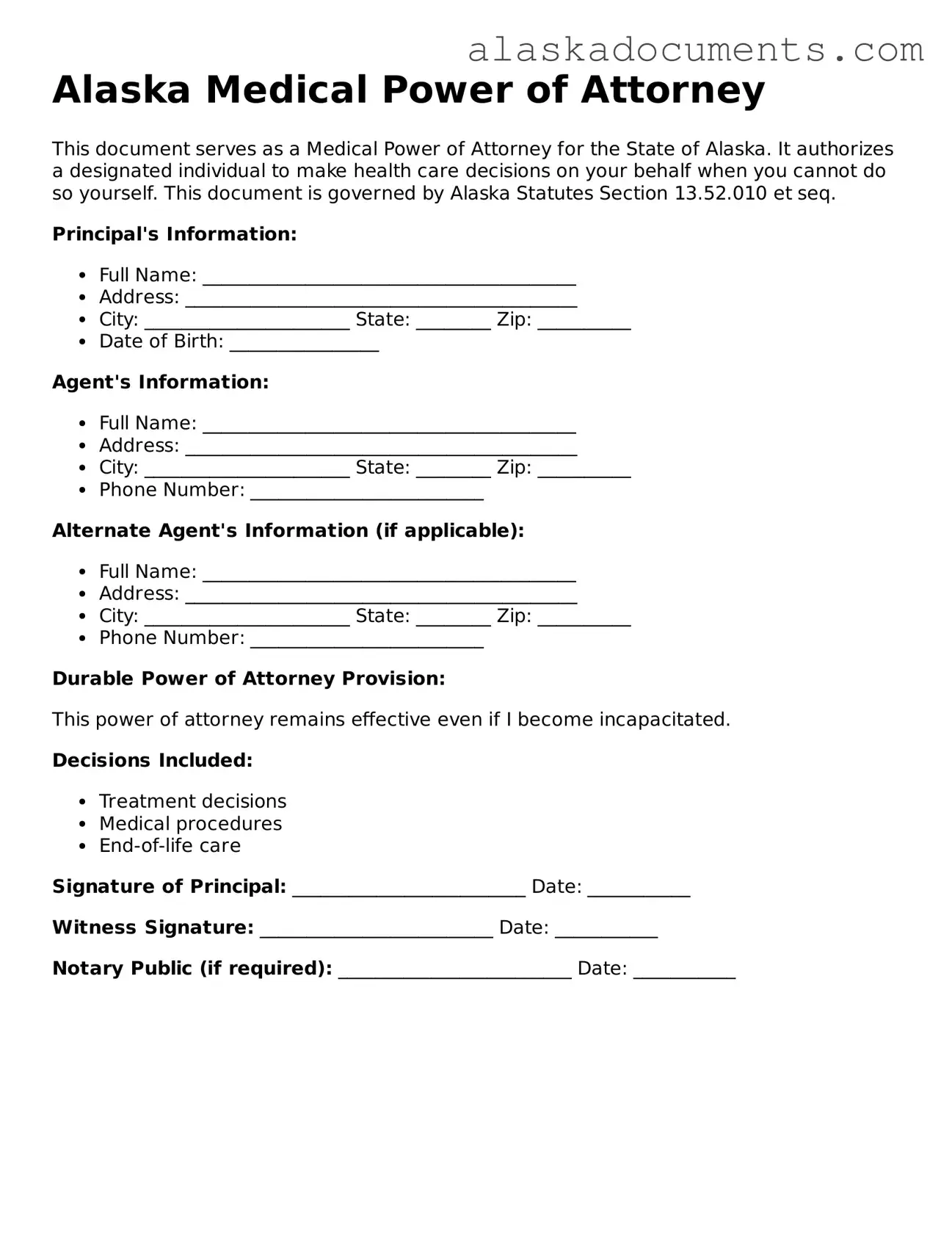The Alaska Medical Power of Attorney form shares similarities with the Durable Power of Attorney. Both documents allow an individual to appoint someone else to make decisions on their behalf. While the Medical Power of Attorney focuses specifically on health care decisions, the Durable Power of Attorney can encompass a broader range of financial and legal matters. This flexibility makes the Durable Power of Attorney a comprehensive tool for managing a person’s affairs when they are unable to do so themselves.
Another document akin to the Alaska Medical Power of Attorney is the Living Will. A Living Will outlines an individual’s wishes regarding medical treatment in situations where they cannot communicate their preferences. While the Medical Power of Attorney designates someone to make decisions, the Living Will provides specific instructions about the types of medical interventions a person does or does not want. Together, these documents ensure that both the person’s desires and their appointed agent’s authority are clear.
The Advance Directive is another closely related document. This term often encompasses both the Medical Power of Attorney and the Living Will. An Advance Directive provides a comprehensive approach to end-of-life care, combining the appointment of a decision-maker with explicit treatment preferences. This ensures that individuals have a say in their medical care, even when they are not in a position to express their wishes directly.
For those looking to facilitate a smooth transaction, utilizing a comprehensive Trailer Bill of Sale form is essential in documenting the sale and transfer of ownership of a trailer, ensuring all transaction details are formally recorded.
The Health Care Proxy serves a similar function to the Medical Power of Attorney, specifically in the realm of health care decisions. This document allows an individual to designate someone to make medical decisions on their behalf. The key difference lies in the terminology; while the Medical Power of Attorney is more common in some states, the Health Care Proxy is often used in others. Both aim to ensure that a trusted person is making decisions aligned with the individual’s values and preferences.
A Do Not Resuscitate (DNR) order also shares a connection with the Medical Power of Attorney. A DNR specifically instructs medical personnel not to perform CPR in the event of cardiac arrest. While the Medical Power of Attorney allows for broader health care decisions, a DNR focuses on a specific medical intervention. This document is crucial for individuals who wish to avoid aggressive life-saving measures, and it complements the Medical Power of Attorney by clarifying preferences regarding resuscitation.
The Authorization for Release of Medical Records is another document that relates closely to the Medical Power of Attorney. This authorization allows a designated person to access an individual’s medical records. While the Medical Power of Attorney grants decision-making authority, the Authorization for Release ensures that the appointed agent has the necessary information to make informed choices about the individual’s health care.
The HIPAA Release Form is similar in that it allows for the sharing of health information. Under the Health Insurance Portability and Accountability Act (HIPAA), individuals have the right to control who can access their medical information. A HIPAA Release Form permits the designated agent to obtain medical records and communicate with health care providers. This is particularly important for the effective execution of the Medical Power of Attorney, as the agent needs access to relevant health information to make sound decisions.
The Guardian Appointment is another document that can be compared to the Medical Power of Attorney. While the Medical Power of Attorney is typically used for health care decisions, a Guardian Appointment is often utilized for individuals who need someone to manage their personal affairs, including health care, due to incapacity. The Guardian is appointed by the court, whereas the Medical Power of Attorney allows individuals to choose their decision-maker in advance.
Lastly, the Revocable Trust can be seen as a related document. Although primarily a financial tool, a Revocable Trust allows individuals to manage their assets during their lifetime and designate how those assets should be handled if they become incapacitated. While it does not specifically address health care decisions, it complements the Medical Power of Attorney by providing a comprehensive plan for both health and financial matters, ensuring that an individual’s wishes are respected in all aspects of their life.

